
The Del McCoury Band performs at Ram’s Head On Stage in Annapolis in November 2017. (Photo by Casey Vock)
Ronnie McCoury, the eldest son of bluegrass legend Del McCoury and the longtime mandolin player for The Del McCoury Band, says he’s never had this much free time in the four decades he’s been performing music.
Ronnie was just a 13-year-old kid when he got his first glimpse of his father’s buddy Bill Monroe playing the mandolin, and, not long after, he was playing gigs alongside his dad. All these years later, Ronnie’s an eight-time International Bluegrass Music Association Mandolin Player of the Year and, just last year, produced the association’s Album of the Year — “Del McCoury Still Sings Bluegrass” — with his dad.
Widely respected in bluegrass and beyond, Ronnie has recorded or performed with the likes of Willie Nelson, John Hartford, Ricky Skaggs, Mac Wiseman, Sam Bush, David Grisman, Garth Brooks, Vince Gill, Charley Pride, Loretta Lynn, Martina McBride, Charlie Daniels, The Gibson Brothers, The Nitty Gritty Dirt Band, Dierks Bentley, and more. He’s produced albums with Grisman and Steve Earle, and, since the mid-1990s, has produced most of his father’s albums.
Stream Del McCoury Still Sings Bluegrass on Spotify:
Additionally, Ronnie serves as the leader of The Travelin’ McCourys, an outfit spun off the Del McCoury Band that blends bluegrass with other sounds and textures. Started in 2009, The Travelin’ McCourys were named the IBMA’s Instrumental Group of the Year in 2018, the same year the group released its first full-length album.
But like many recording and touring musicians, Ronnie finds himself unable to travel and perform due to the national COVID-19 emergency, and even recording music can be a bit of a challenge these days too, as he and his family — including his brother and bandmate, Robbie, the 2015 IBMA Banjo Player of the Year — are working to keep a healthy distance from their father, who is now 81 years old.
It’s also put a current postponement on Del Fest, the bluegrass festival Ronnie’s family hosts each year in late May at the Allegany County Fairgrounds in Cumberland, Maryland.
So with the spare time, we caught up with Ronnie from his home in Hendersonville, Tennessee, for a friendly phone conversation on an assortment of topics, including his family’s connection to Baltimore, festivals and their importance, life under quarantine, the impact on his father and their ability to record, tornadoes, Ocean City, and so much more.
Describing his current oversupply of free time, including growing a beard:
I started playing music with my dad in 1981, and I was a teenager and we lived in Pennsylvania and we didn’t play as much. We started getting really busy as I got older, just because my dad you know he was working in the woods there in Pennsylvania cutting timber mainly, by the time I turned 18, he’d quit, and then in my early 20s, I moved to Nashville, and I have never had this much time off. I’ve actually enjoyed being home. I’d live out of one of those shaving kits. This is the first beard I’ve had in 53 years. I haven’t shaved since all this started in March. It’s getting out there. I’m starting to show my age, it’s really gray.
On the family connection to Baltimore:
We grew up, it was 40 miles from like the center of Baltimore up over the PA line, maybe not even that far, but we were just the first exit, second exit, right around there, that’s where I grew up. My dad, of course, when he started his whole career, he played in Baltimore for years, and then got discovered in Baltimore by Bill Monroe. And then when I was playing, a couple of the guys that were in the band at the time were living in Baltimore, and I’d go down there and hang with them. So, a pretty good connection there.
On the family aspect of The Del McCoury Band:
Three-fifths of the band are family. And (violinist) Jason Carter, he started with us in 1992 as a 19-year-old kid, so they’re pretty much like brothers. We only had one band member change from 1992 ‘til now, and (bass player) Alan Bartram, well, let’s see he’s been with us for 14 years or 15 or something like that. So as far as the friendship on stage, it’s about like family, all of us.
Describing his father as a musician and a singer and their communication on stage:
Well, I think it’s how time changes things you know? In the beginning, just me and my brother both, I guess, we learned everything about stage life and playing music and all that from my dad, and we looked up to him so much, and you know as time goes on.
And he’s 81 years old. He’s still incredibly vibrant as a singer. It knocks me out, and what he does is not easy, because a lot of time he sings lead, and then when the chorus comes he automatically goes to a tenor part, and for the majority because he has the higher timber in his voice, the songs are pitched high, and they are high to sing. And I really don’t know many guys that can do that. You can talk about all the great singers, and there’s so many in this world that maybe even sing great at an older age, but they’re lead singers, they don’t switch and go to a tenor part, most of them don’t ever do that. You name one to me that is known as an older great singer and for the most part I will say they don’t switch their parts, which is not an easy thing to do, and like I said it’s high and hard to sing.
And he’s not dropped or changed keys since he was a young, young man. Until now, he’s in the same register. That’s what a lot of thee next generations under him, the Sam Bushes and the Ricky’s [Skaggs], they really appreciate. I think they look up to him, because they’re 10 to 15 years younger than him, and they say “wow.” They’ve actually told me that, “We want to do this like your dad is,” and be able to do that and have that longevity. It’s just something … he’s a natural. … He’s a natural.
And every day you sing and play differently in a way because you feel differently and a lot of times, he forgets words, and he’s the best at getting out of it usually. But a lot of times, that’s what the guys — we’re all on the edge of our seats there, ready to pitch him the next word.

The Del McCoury Band performs at Cervantes’ Masterpiece in Denver on Dec. 9, 2017. (Photo by Casey Vock)
Discussing influences, being influenced and the willingness to share your influences:
There’s a great quote from Bill Monroe I heard when I was young, he said … it’s like, “Man, where’s this guy come from? who’s he listened to? where’s he learned from?” He never really said anybody, except his Uncle Tim, which he wrote a famous song about, and another guy named Arnold Shultz, who was a black Western Kentucky guitar player and singer he learned to play with.
Well after that, he never talked about anybody else and somebody had asked him about this, and he said that he takes music in basically but you’ll never known where it came from. I heard that as a young guy, and I’m not that way. I definitely say who I like and who I listened to: Bill Monroe, and David Grisman, and Sam Bush — mandolin guys like that. Then the Grateful Dead and the Allman Brothers, when I was a kid, that was one of the first things that hit me was twin guitar stuff and their feel. I know that both of those two bands I just mentioned influenced how many? Because they liked to jam, both of them.
It wasn’t pop music that was defined as a four-minute song. Phish comes out of that same thing. They like that kind of music, jazz music — a band like that has all kinds of influences. I guess everything you hear as a musician, it comes out somehow some way. Even to this day, I still try to learn tunes [from different] people. I think there’s a lot of great mandolin players, and I’m mainly learning older mandolin players tunes I’ve always wanted to know — the Jethro Burns, and stuff like that. But singing is a whole different ball game. I’m not as natural of a singer as my father. He’s just a natural born singer. It’s a little harder work for me, it has been through the years, just to come by it. So that’s kind of fun too, to learn it.
On the crossover/connection between bluegrass and what’s called “jam band” music or rock or jazz:
It’s basically just the improv. I do come from a three-minute song — bluegrass music and it has its form, and it was that other stuff that I told you about that I had listened to a lot, and never really got to do it that much with my dad. We did later, with things like “My Love Will Not Change,” a song we kind of jammed out on. It evolved into that. My dad, he was the same way, he was a three-minute song guy. But it’s just the evolution of us, I guess, and maybe the part of his life that includes [The Del McCoury Band] being that, that brought that into his music, I’ll put it that way. The listener … it’s true. Anymore, there’s just music lovers. The people that come to see us, they’re not tied to one type of music. I think that’s what’s happened with most listeners, they enjoy hearing all kinds of music, if it’s good. You know, the old Duke Ellington expression, there’s only two types of music — good and bad.
Watch The Del McCoury Band perform “My Love Will Not Change” live at Del Fest on May 30, 2015, via YouTube:
https://youtu.be/1Sly_qahE9I
On promotion, marketing, and a path for live music:
I don’t think anyone knows right now what to do. As far as marketing, it’s the strangest thing right now. We’re not going to be playing in front of people for a while. I kind of feel like, we will be one of the first, our size of ticket sales of course, baseball games, football games, we’ll be the first ones out, probably, that can get away with it, even if we have to go down to 200 seats, or talking about my dad, which is normally more than 500 a night. But as far as marketing, we’re sitting around saying, “How is all this turning here?”
On Del Fest’s current status:
As far as Del Fest for us, we had to kind of pull the plug, and we’re pushing it, we’re not completely getting rid of it this year. But we’re going to go by what is healthy and what Maryland as a state says.
More on current online digital marketing and social media:
Last night, I did the first ever Instagram live thing … and we got done and I was like, “This is where it’s at?” I just don’t know right now, we haven’t built any of our [accounts/platforms] on social media — not that we don’t use it. My dad’s already got about 60 years of playing live shows, and I’ve done 40. So this whole thing is weird. We’re all trying to figure it out.
Sharing his views on the worst impacts of the virus:
There’s so many cruel things about this between the way it’s hit America and the way it’s affected people and how it’s been handled — I mean, there’s too many things. But the other cruel thing to me, is that for someone like my dad, who’s say … still in his prime and can’t do what he likes and loves. That’s to me that’s really a hard thing, even his recording. We had the studio set, we were going in, my dad was going to record some more songs, and everybody is just social distanced and put all that on the backburner. Days turn to years as you get older, and before you know it it’s going to be 2021 in the blink of an eye. I’ve not said anything to him, but I think it’s kind of cruel in that way, you can’t really do what you love to do right now.
Describing a photo of himself on the way to a festival 1981 recently posted to social media:
That picture was the third festival I think I ever played with my father. Now, I grew up going to them with him, we’d go to them as a family. Back then, my dad would play three days at a festival. That was not uncommon for bands to do that. Now it’s just one day you’re here and you’re gone, you’re moving on. For me, it’s just part of who I am. It’s hard for me to give anything but how it affected me because I grew up going to them, so it means the world to me. People that come to Del Fest, I can just tell you what people have told me, they spend their once-a-year vacation with us. It just put it in perspective with me because that’s all I do is go to them, coast to coast, sometimes coast to coast in two days. And I see what it means to people to be at a gathering. Del Fest, there’s so many stories about people falling in love and getting married and having children because they met at Del Fest, naming their kid Del. Stuff like that, it’s powerful. It’s hard for me to imagine not having festivals.
https://www.instagram.com/p/B_V5Sx1hEAW/?utm_source=ig_web_copy_link
Pondering creative festival ideas:
My dad told me last week, “We used to do this, and we could probably do this — we used to play drive-in- moving theater. And people would hang the speaker in their window for the movie and the music.” And he said, “We stood up on top of the concession stand with a microphone. And we’d play, and they’d honk their horns.” I get an email yesterday from our partners with High Sierra in California, who partnered with us for Del Fest, and they sent this article. Somewhere overseas, somewhere there was a DJ festival. And it was the same thing. People were sitting in their cars and waving their arms out the windows, and that’s how they’re doing this weekend festival, just like a drive-in movie. That’s where they’re at. You imagine that? I read an article saying that might be the new thing because no one wants to go into a movie theater right now, so drive-ins can make a big come back right now.
Describing the importance of the DIY approach for musicians:
For sure, it is [more important]. Because of all the streaming and all that, our old record table days where you sell a lot of merch or whatever, that still goes on but it’s less and less about selling music — it’s more about T-shirts and other kinds of merchandise. And it seems like, well, we sell more albums than CDs anymore basically — that’s how that thing’s flipped. And I think most people depend now on ticket sales. That’s where it all went to. Grateful Dead sure did — they did that for years. Phish, the same way. These guys who are, in my opinion, pretty big rock stars but never had any kind of radio hits. So what those guys did and still do, and a lot of other bands do but aren’t as good at it … is the streaming live shows and selling it and all that kind of thing.
Discussing recording before the virus and moving forward:
As far as recording, we have been fortunate with my dad … we used to make a record every two years and try to work it and all that kind of stuff and that kind of went to the wayside and then we did some singles, you know went back to the old ’60s and ’70s template of releasing singles. And that seems to kind of be what’s happening, and we were still kind of into that before all this happened.
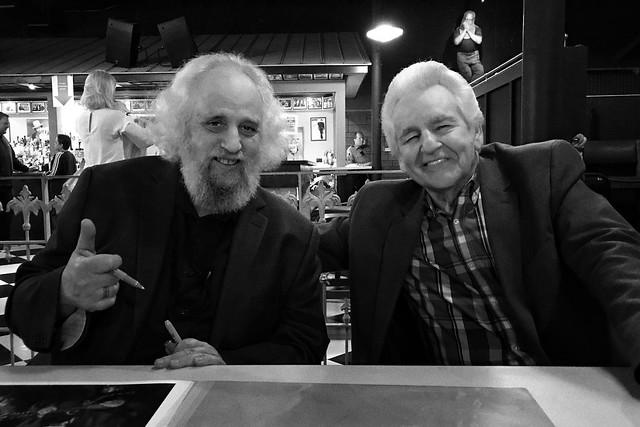 Ronnie McCoury’s father, Del (right), with David Grisman at Del & Dawg show at The Birchmere in Alexendria, Virginia, on March 15, 2019. (Photo by Casey Vock)
Ronnie McCoury’s father, Del (right), with David Grisman at Del & Dawg show at The Birchmere in Alexendria, Virginia, on March 15, 2019. (Photo by Casey Vock)
Describing his father’s current songwriting efforts with limited resources:
He’s got all his songs and he’s even got more. He’s been really working on learning new songs. He doesn’t write as much anymore. He gets a lot of songs from who knows, just anywhere. It could be maybe a popular artist, or more likely it’s just some guy who wrote a song and sent it to him and he likes it. … He doesn’t really work computers or anything like that, and he’s got a flip phone — my mother’s more into the iPhone — my dad’s funny, he calls [his] the phone that never rings. I’m sure it’s in the drawer somewhere right now.
So we said, well, he needed something to record with. So we just got him one of them older tape players, a little square 9- or 10-inch long by 5-inch wide tape player, and he loved it. This just happened in the last month or so — got it online, it’s brand new. And he has like 25 songs on this thing. Now he says “Well, now it’s starting to run fast and run slow.” So you know the old decks the big ones that go in your system? They have a record button. So, I’m working on that for him, and going to just a really good microphone, a really good little interface. He ordered it all and it’s supposed to be delivered this week. I’ll probably have him set it outside, and I’ll try to put it together and then let them all clean it down and put it back in the house and see how it goes. But that’s where we’re at with recording right now.
The handheld things now can be so complicated. You gotta recall files and all this stuff. I don’t have one and I have to tell him how to do it. … Mainly if I was sitting around I’d use the iPhone and use a voice memo and get it down. But the same thing — I’m doing the same thing: I’m trying to order all this recording stuff because people still say, “Hey, would you play on my track or sing on something,” and I don’t have much of a way to do it. A guy like me who spends 150 days on the road and then when I am home, I’m a family guy. I try to spend all my time, I just never really had that much time or put much that much effort into it. But now I will. It’s where we’re at.
Talking about his son Heaven, who is a talented up-and-coming guitar player:
He gigs with us, and he’s got his own band called The Broomestix and they’re a ten-piece Jazz funk band. Boy, he’s really good. But everything’s frozen right now. But at least I have him to play with too, you know.
Talking tornadoes:
You talk about something brutal, those tornadoes. When I lived closer to town — I moved up here (to Hendersonville) in 2002 — when I lived in Nashville, we had a devastating tornado come through in what would have been the late ’90s. My wife was home with Heaven, he was a baby. I called home — I was in California, before cellphones — and she was in the closet. It just missed us by a mile that time. This (recent) one, we lucked out, and it was supposed to come this way, but it didn’t — it turned, and it went more east, we’re more northeast. But, man, you can’t do anything about getting out of the way of them.
On the origins of the Del Fest location, in Cumberland, Maryland:
It’s about a hundred miles from our hometown. Roy Carter, he runs festivals in California — High Sierra (Music) is the group. They have a couple of festivals. He partnered with us and came east. We didn’t want to do it around Nashville because it was too hard … We didn’t want this area. We wanted some place closer to where we were from or [on] the East Coast. Roy found a couple places for my dad to look at. That was the first one we went to, there in Cumberland. It’s a beautiful spot. It has everything that a festival kind of needs as far as a late-night indoor place, and if anything happens, we can move inside anyhow. My dad said, “I don’t need to go anywhere else, this is a perfect place.” That’s kind of how it happened. … We try to be connected to the community as much as we can be with traveling. We get up there a couple times a year.

The Travelin’ McCourys perform at Cervantes’ Masterpiece in Denver on Dec. 9, 2017. (Photo by Casey Vock)
Considering the next steps for The Travelin’ McCourys:
We were about ready to go into the studio at the same time (as the coronavirus outbreak) and record some things, and even do it as singles, because like I said that’s kind of what’s happening. We’ve actually been together 10 years, and we only have one thing that finally got finished … In a way, [the band] was my dad’s idea. He’d just turned 70, or 71 — whatever it was. He was kind of looking at longevity.
He said “Guys, if something happens to me or happens to my voice, and I can’t sing, I’d hate for you boys to start out cold.” So he allowed us the opportunity take up some of some of his calendar for the year, every year, and do this. And man it just … we didn’t have a full-time guitar player — had so many come and go. Bill Nershi would gig with us. Tony Rice played some gigs with us. We went out and played with Peter Rowan. We did some Keller Williams stuff.
And then couple years ago, we hired Cody Kilby. He plays guitar, and he’s just a hot-shot guitar player. We’ve known him since he was just a little boy in bluegrass music. He was a banjo player. He was like a prodigy. Long story short, then we finally got a guy that we could hire that could stay with us and make records. And so we finally we got that one [album] done and we’re working on another one. Luckily for us — this was going to be our best year — I just think when everything opens up again people are going to go be as supportive, more than ever before, for music. … We’re just looking forward to more years of this. I’m so grateful and so thankful that I can still play with my dad half the time and be able to do our own thing too.
Watch The Travelin’ McCourys perform “Cumberland Blues” at Music City Roots Live from the Factory on Aug. 12, 2015:
On his hometown:
It’s York County, and I was born in York Hospital. But where we’re from, the town is called Glen Rock. That’s basically where we’re from. It’s only two miles to the Maryland line.
Memories of living in Ocean City:
When it was — I guess it was my 18th year — after I got out of school, everyone would go down to the ocean for the graduation week. Then I wound up living down there for that summer with my buddies in an apartment in Ocean City, Maryland. I was the guy that was there Monday to about Thursday, and then I was gone when everybody else really blew it out on the weekend. So I’d come in and everyone’s just licking their wounds. But yeah, I spent a little time there in Maryland.
**
Thanks to Ronnie McCoury for the generous interview!
Visit the website of The Del McCoury Band for more music by Ronnie and his father.
Visit the website of The Travelin’ McCourys for more music by Ronnie and his brothers.
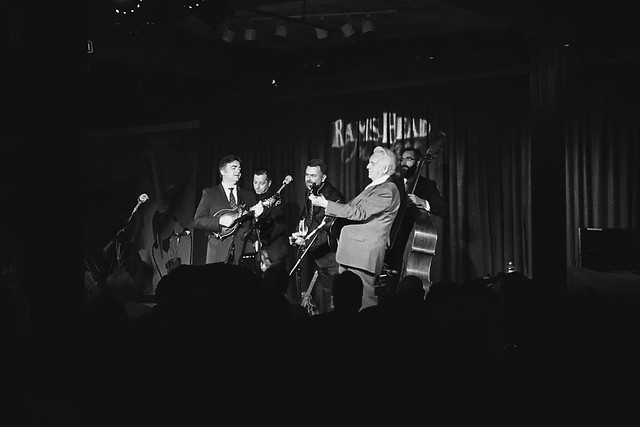
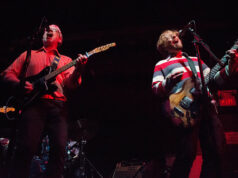
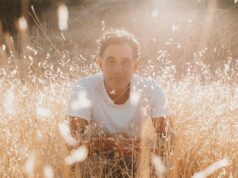
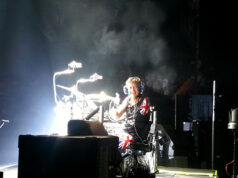



What a great interview…I have been a McCoury Fan for around 50 years… Miss all these guys..